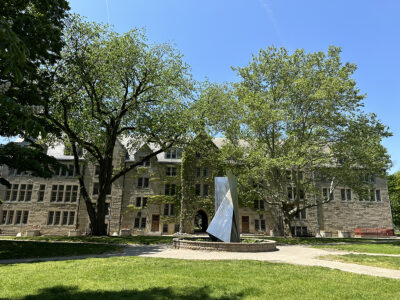The University of St. Michael’s College is proud to announce that we have reached our target of fully divesting from fossil fuels five years ahead of schedule. As of Friday, April 25, 2025, the university had absolutely no investment exposure to fossil fuels.

Collegium, the university’s governing body, identified 2030 as the target date for full divestment at its June 2023 meeting, the same date the University of Toronto had selected in 2021 for itself.
“The Collegium’s decision to begin divesting St. Michael’s from fossil fuels was an institutional response to the urgent need to care for all creation, inspired by the university’s Mission Statement,” says Chair Susan Helstab. “As an alumna and trustee, I am proud that USMC has led by example and will inspire conversation and action at other Catholic and higher-education institutions.”
The decision marks a significant moment in the university’s history, says St. Michael’s President David Sylvester.
“Sustainability is one of the three pillars of St. Mike’s 180, our strategic plan,” says Sylvester. “By moving away from investing in fossil fuels we want to demonstrate to stakeholders that we see sustainability not just as a goal but as a principle that guides our lives. This accomplishment is good for our students, good for our university and good for the broader community.”
St. Michael’s Collegium Investment Committee has been consistently focused on environmental, social and governance (ESG) standards since the committee was struck in 2012, notes committee chair Michael Binette.
“It’s in our DNA to be highly sensitive to ESG,” says Binette, who cites a variety of powerful influences on the committee, from the Sisters of St. Joseph through to former committee member Mary Ann Leon, who is particularly passionate about divestment and ESG, he says.
In 2013, St. Michael’s ceased to have direct investments in fossil fuels when the committee advised a move to invest in pooled funds instead. In time, the university engaged SHARE, the Shareholder Association for Research and Education, and UNIE, an investor network for university pension plans, foundations and endowments, to examine ESG matters in companies in which St. Michael’s was invested via the pooled funds.
Collegium committed in 2023 to complete fossil fuel divestment, in part influenced by increasing student interest. There was also, however, the profound influence of Laudato si’, Pope Francis’s 2015 encyclical on the environment, as well as the university’s strategic plan. Released in 2021, the plan asserts that “St. Michael’s will commit to orient itself proactively and lead as an institutional that is dedicated to social justice and sustainability, whether environmental, social or financial.”
With the commitment in place, the Collegium’s Investment, Finance & Audit, and Executive committees began assessing the risks and benefits of divesting, and a memo was drafted which promised maintaining an “overall responsible investment approach” that would incorporate ESC considerations.
“We did our homework,” Binette says of the committee’s search for pooled funds that did not include fossil fuels but that offered returns appropriate for the university’s needs. Only a limited number of such funds were available, and the committee rated them on issues such as track record, returns and history. “We were knowledgeable and in a good position.”
“This choice … reflects a strong commitment to the college’s core values of respectful dialogue, ethical responsibility, and the courage to take meaningful action in the face of complex challenges,” says Elizabeth Xu, the voting member student representative on Collegium. “What makes this action especially impactful is the example it sets for students—the next generation of world changers. It sends a clear message about the power of education to create impact beyond oneself and contribute to meaningful, global change.”
The move to full divestment is the latest step in St. Michael’s long commitment to environment and sustainability issues. A prime example is the establishment of the world-renowned EIliott Allen Institute for Theology and Ecology (EAITE) in 1991 to facilitate ecumenical and interdisciplinary scholarship to cultivate practices for an inclusive, just and ecologically sustainable society.
“St. Michael’s decision to divest from fossil fuels is a profound act of faith and justice. As Laudato Si’ reminds us, everything is interconnected—our economy, the earth, and the well-being of the most vulnerable,” says Professor Hilda Koster, who holds the Sisters of St. Joseph of Toronto Chair in Theology at the Regis St. Michael’s Faculty of Theology and is director of the EAITE. “Pope Francis called us to respond to the cry of the earth and the cry of the poor, and this step reflects our commitment to shaping a future rooted in ecological responsibility and moral integrity. It’s a powerful witness to the kind of world we believe is possible.”
In 2023, Regis College and the University of St. Michael’s College were officially designated Blue Communities, joining in a project that encourages municipalities to protect water as a human right and public trust, and to promote public water over bottled water. St. Michael’s College Student Union (SMCSU) paid to install fillable drinking water stations across campus.
As well, the university’s facilities department continues to focus on efforts to make St. Michael’s infrastructure more environmentally friendly, for example installing energy efficient windows and timed faucets and light fixtures to reduce waste and save energy.
One of the sustainability goals stated in St. Mike’s 180 is to “embed environmental and social responsibility into all university operations, urging community members to do the same.”
Fossil fuel divestment is an important sign of living up to that promise.

